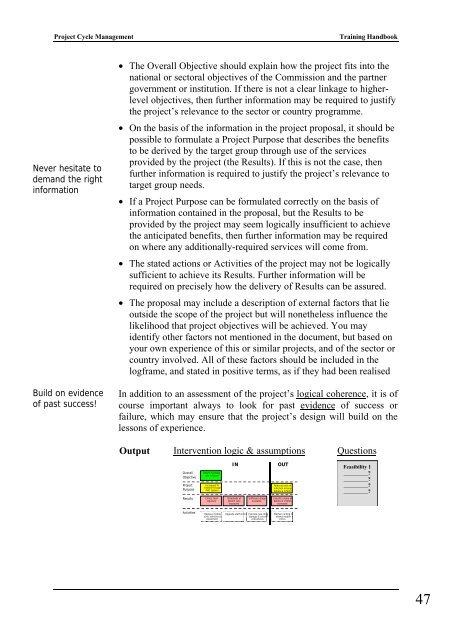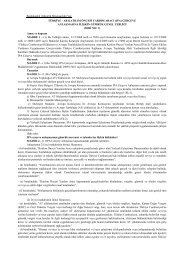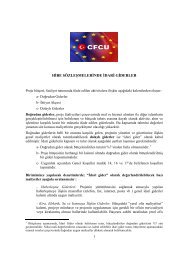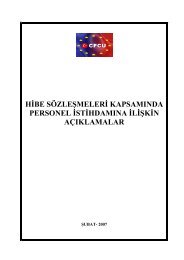Project Cycle Management Training Handbook - CFCU
Project Cycle Management Training Handbook - CFCU
Project Cycle Management Training Handbook - CFCU
You also want an ePaper? Increase the reach of your titles
YUMPU automatically turns print PDFs into web optimized ePapers that Google loves.
<strong>Project</strong> <strong>Cycle</strong> <strong>Management</strong> <strong>Training</strong> <strong>Handbook</strong><br />
Never hesitate to<br />
demand the right<br />
information<br />
Build on evidence<br />
of past success!<br />
• The Overall Objective should explain how the project fits into the<br />
national or sectoral objectives of the Commission and the partner<br />
government or institution. If there is not a clear linkage to higherlevel<br />
objectives, then further information may be required to justify<br />
the project’s relevance to the sector or country programme.<br />
• On the basis of the information in the project proposal, it should be<br />
possible to formulate a <strong>Project</strong> Purpose that describes the benefits<br />
to be derived by the target group through use of the services<br />
provided by the project (the Results). If this is not the case, then<br />
further information is required to justify the project’s relevance to<br />
target group needs.<br />
• If a <strong>Project</strong> Purpose can be formulated correctly on the basis of<br />
information contained in the proposal, but the Results to be<br />
provided by the project may seem logically insufficient to achieve<br />
the anticipated benefits, then further information may be required<br />
on where any additionally-required services will come from.<br />
• The stated actions or Activities of the project may not be logically<br />
sufficient to achieve its Results. Further information will be<br />
required on precisely how the delivery of Results can be assured.<br />
• The proposal may include a description of external factors that lie<br />
outside the scope of the project but will nonetheless influence the<br />
likelihood that project objectives will be achieved. You may<br />
identify other factors not mentioned in the document, but based on<br />
your own experience of this or similar projects, and of the sector or<br />
country involved. All of these factors should be included in the<br />
logframe, and stated in positive terms, as if they had been realised<br />
In addition to an assessment of the project’s logical coherence, it is of<br />
course important always to look for past evidence of success or<br />
failure, which may ensure that the project’s design will build on the<br />
lessons of experience.<br />
Output �� Intervention logic & assumptions<br />
Overall<br />
Objective<br />
<strong>Project</strong><br />
Purpose<br />
Results<br />
Activities<br />
Infant mortality<br />
rate reduced<br />
Increased %<br />
treated through<br />
PHC system<br />
Clinics held<br />
regularly<br />
Replace mobile<br />
clinic vehicles &<br />
equipment<br />
IN OUT<br />
Standards of<br />
patient care<br />
improved<br />
Sufficient drugs<br />
available<br />
Reduced rate of<br />
infection among<br />
babies & infants<br />
Calorific intake of<br />
babies & infants<br />
increased<br />
Upgrade staff skills Institute new drug Mothers willing to<br />
storage & control attend mobile<br />
procedures<br />
clinics<br />
Questions<br />
Feasibility 1<br />
_________?<br />
_________?<br />
_________?<br />
_________?<br />
47





